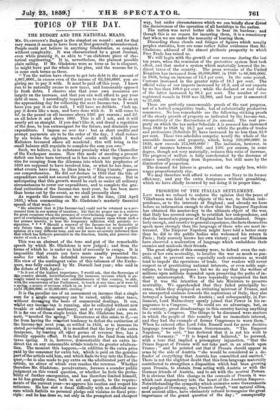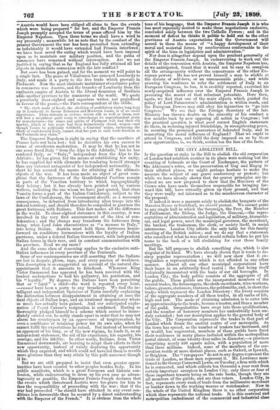PROGRESS OF THE ITALIAN SETTLEMENT.
LAST week we refused to endorse the opinion that the peace of
Villafranca was fatal to the objects of the war, to Italian inde- pendence, or to the interests of England; and already we have before us information enough to show that the Emperor Napoleon has obtained the master-key to the ultimate object of the war, that Italy has secured enough to establish her independence, and that the immediate purpose of England has been attained. Singu- larly enough, and counter to general experience, the facts themselves speak more strongly than the language of those who are most in- terested. The Emperor Napoleon might have told a better story than he did to the public bodies who welcomed his return to Paris ; Italy scarcely knows her own victory ; and our Ministers have observed a moderation of language which emboldens their enemies and misleads their friends.
The great objects of this country were, to defend even the out- posts of her own neutrality, to localize the war as much as pos- sible, and to prevent more especially such extensions as would tend to impede the operations of trade. Our readers will never suspect us of prostituting national interests, or even noble aspi- rations, to trading purposes ; but we do say that the welfare of millions upon millions depended upon preserving the paths of in- dustry uninterrupted. We have repeatedly recognized the faot that it was the intention of the late Ministers to preserve neutrality. We apprehended that they failed principally be- cause, while they displayed an irritating mistrust of France, and an unexpected coolness towards the aspirations of Italy, they also betrayed a leaning towards Austria ; and subsequently, in Par- liament, Lord Malmesbury openly joined that Power in his re- pugnance to a Congress. " He could see no advantage, but, on the contrary, great disadvantage in this country having anything to do with a Congress. The things to be discussed were matters in which the people of this country had no immediate interest, and they had the example of former Congresses to warn them." When he entered office Lord John Russell used far more decisive language towards the German Governments. a The Emperor Napoleon," he said, a has declared that it is not his wish to attack Germany." " It is hoped and believed," he pursued, with a tone that implied a peremptory injunction, "that the Prince Regent of Prussia will not take part in an attack upon France ; " and he pointed out that if Prussia should appear in arms by the side of Austria " she would be considered as a de- fender of everything that Austria has committed and omitted." There is not the slightest doubt that _this firm language materially contributed to strengthen a disposition which had been growing upon Prussia, to abstain from acting with Austria or with the German friends of Austria, and to act with the neutral Powers. It is obvious that this change in the counsels of Prussia it was which cast despondency into the heart of the Austrian Emperor. Notwithstanding the sympathy which animates some Governments and peoples of Germany, says Francis Joseph, "our natural most ancient allies, have obstinately refused to recognize the great importance of the grand question of the day; " consequently " Austria would have been obliged all alone to face the events which were being prepared" for her, and the Emperor Francis
Joseph promptly accepted the terms of peace offered him by the Emperor Napoleon. Upon those terms we shall have a word to say presently ; meanwhile let ns note that by the conduct of the present Government the war has been prevented from extending as indubitably it would have extended had Prussia interfered ; we have been saved the outlay which would have been imposed upon us to maintain our military .position, and the paths of
commerce have remained without interruption. Are we not justified in saying that so far England has fully attained all her objects in immediate connexion with the late conflict? But more has been gained, and for the moment we will point to a single fact. The peace of Villafranca has annexed Lombardy to Italy, and made it a party to the free trade which prevails in Piedmont. Now the most obstinate maintainer of exclusive policy in commerce was Austria, and the transfer of Lombardy from the exclusive empire of Austria to the liberal dominion of Sardinia adds another province to the commerce of the world. We quote a peculiarly clear-sighted and sagacious writer, not prejudiced in favour of the peace,—the Paris correspondent of the Globe.
" The cloth trade of Leeds, the abolition of prohibitory duties long kept up in Lombardy to favour Bohemian and Moravian looms, is of no small importance. Swiss industry in cottons, woven silk as well as linen, now will find a neighbour quite ready to interchange its superabundant grain for manufactures—the wines and spirits of Piedmont will find their old market, which of late years had been hermetically closed, reopen—and though Venice be politically withheld, a Customs' union, embracing the whole of confederated Italy, cannot shut her port to such trade freedom as the Peninsula may claim.
The Emperor Napoleon is right in saying that the sacrifices of France have not been lost ; but he describes his own success in terms of overdrawn moderation. It may be that he has not in one sense freed Italy " from the Alps to the Adriatic," but he has rendered Italy, as "Italy," independent from the Alps to the Adriatic ; he has given her the means of establishing her unity, he has supplied her with elements for rendering herself stronger than any external antagonist of her independent nationality. In short he has secured the means for attaining all the ultimate objects of the war. It has been made an object of great com- plaint that the fortresses of the Quadrilateral Position remain as parts of the Venetian territory to which topographically they belong ; but it has already been pointed out by various writers, including the one whom we have just quoted, that since Venetia forms a part of the Italian Confederacy, subject to the laws of the Confederacy, the Government should, as a necessary consequence, be debarred from introducing alien troops into the federal territory, and should therefore be compelled to garrison the great fortresses with Italians. This fact makes all the difference in the world. To clear-sighted statesmen in this country, it was involved in the very first announcement of the idea of con- federation ; and the change may transform the fortresses from being what Lord John characterizes as " a menace to Italy," into being Italian. Austria must hold those fortresses hence- forward on conditions harmonious with the loyalty of Italian garrisons, under a federal Italian Government, with independent Italian forces in their rear, and in constant communication with the province. Need we say more ? And the same class of reasoning applies to the exclusive anti- Italian influences in every province of the Peninsula. Some of our contemporaries are still asserting that the Italians are lost in despair, gloom, rage, and every passion of weakness. This description is so exaggerated an account of the natural dis- appointment that it amounts to falsehood. Wherever King Victor Emmanuel has appeared he has been received with the loudest acclamations to hail his gallantry, his patriotism, and his " loyalty." By degrees the Italians have been perceiving that so " loyal" a chief—the word is repeated every hour, —cannot have been a party to any treachery. We find the in- telligent and independent Opinione of Turin carefully explaining the distinction between disappointment in attaining at once the final objects of Italian hope, and an irrational despondency where so much has actually been gained. And our anticipated expla- nation of Count Cavour's resignation is confirmed. Having so thoroughly pledged himself to a scheme which cannot be imme- diately carried out, he nobly stands apart in order that he may not alarm his countrymen by an appearance of tergiversation, by even a semblance of retaining power for its own sake, when he cannot fulfil the expectations he raised. But instead of becoming an opponent of his king, or of the new regime, he lends it, as an independent statesman, the aid of his experience, his sagacity, his courage, and his fidelity. In other words, Italians, from Victor Emmanuel downwards, are learning to adapt their efforts to their new opportunity, instead of vainly deploring the opportunity which they expected, and which could not have led them to results more glorious than they may attain by this path narrower though it be.
But we are still prepared to insist that even greater oppor- tunities have been secured to other peoples besides Italy. In his public manifesto, which is a great European and historic con- fession, while endeavouring to dress up his own case as advan- tageously as possible, the Emperor Francis Joseph declares that the events which threatened Austria were too grave for him to face the responsibility of proceeding with the war ; that if the war had proceeded "he should have obtained in any event con- ditions less favourable than he secured by a direct understanding with the Emperor of the French." It is obvious from the whole tone of his language, that the Emperor Francis Joseph it is who has moat especially desired to make these negotiations exclusive, concluded solely between the two Catholic Powers ; and in the moment of defeat he thinks it politic to hold out to the other provinces of Austria expectations that the Government will accord to them the means of " a happy development of their moral and material forces, by amelioratIons conformable •to the spirit of the time in legislation and administration." Nor does it altogether depend upon the penitent generosity of the Emperor Francis Joseph. In endeavouring to work out the details of the convention with Austria, the Emperor Napoleon has, as we anticipated, found that it would not be easy to complete all the arrangements without the concurrence of the other Eu- ropean powers. He has not proved himself a man to stickle at the dictate of self-love, or an unreasonable pride ; and while avowing his readiness to refer the settlement of Italy to an European Congress, he has, it is credibly reported, exercised his newly-acquired influence over the Emperor Francis Joseph in procuring the assent of that reluctant potentate. Here then, again, we find that one of the main objects which guided the policy of Lord Palmerston's administration is within reach, and the European Powers may still obey his injunction to " go into Congress." We see that the Foreign Secretary of the late Ministry has thrown doubts on the sincerity of his conduct a few months back by now opposing all action in Congress ; but the practical question is what good cannot 'English statesmen do there, in restoring injured friendships, in strengthening peace, in securing the promised guarantees of federated Italy, and in reasserting the moral influence of England? That we ought to attend in Congress, and fulfil the duty imposed on us by these new opportunities, is, we think, eviden ton the face of the facts.



























 Previous page
Previous page